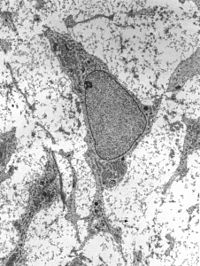
Photo from wikipedia
Background Clinical trials using ex vivo expansion of autologous mesenchymal stromal cells (MSCs) are in progress for several neurological diseases including multiple sclerosis (MS). Given that environment alters MSC function,… Click to show full abstract
Background Clinical trials using ex vivo expansion of autologous mesenchymal stromal cells (MSCs) are in progress for several neurological diseases including multiple sclerosis (MS). Given that environment alters MSC function, we examined whether in vitro expansion, increasing donor age and progressive MS affect the neuroprotective properties of the MSC secretome. Methods Comparative analyses of neuronal survival in the presence of MSC-conditioned medium (MSCcm) isolated from control subjects (C-MSCcm) and those with MS (MS-MSCcm) were performed following (1) trophic factor withdrawal and (2) nitric oxide–induced neurotoxicity. Results Reduced neuronal survival following trophic factor withdrawal was seen in association with increasing expansion of MSCs in vitro and MSC donor age. Controlling for these factors, there was an independent, negative effect of progressive MS. In nitric oxide neurotoxicity, MSCcm-mediated neuroprotection was reduced when C-MSCcm was isolated from higher-passage MSCs and was negatively associated with increasing MSC passage number and donor age. Furthermore, the neuroprotective effect of MSCcm was lost when MSCs were isolated from patients with MS. Discussion Our findings have significant implications for MSC-based therapy in neurodegenerative conditions, particularly for autologous MSC therapy in MS. Impaired neuroprotection mediated by the MSC secretome in progressive MS may reflect reduced reparative potential of autologous MSC-based therapy in MS and it is likely that the causes must be addressed before the full potential of MSC-based therapy is realized. Additionally, we anticipate that understanding the mechanisms responsible will contribute new insights into MS pathogenesis and may also be of wider relevance to other neurodegenerative conditions.
Journal Title: Cytotherapy
Year Published: 2018
Link to full text (if available)
Share on Social Media: Sign Up to like & get
recommendations!